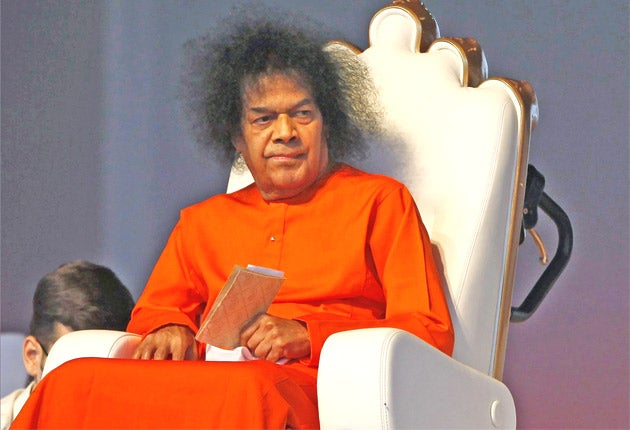Sathya Sai Baba: Guru and philanthropist who was revered by millions but whose career was dogged by controversy

Your support helps us to tell the story
From reproductive rights to climate change to Big Tech, The Independent is on the ground when the story is developing. Whether it's investigating the financials of Elon Musk's pro-Trump PAC or producing our latest documentary, 'The A Word', which shines a light on the American women fighting for reproductive rights, we know how important it is to parse out the facts from the messaging.
At such a critical moment in US history, we need reporters on the ground. Your donation allows us to keep sending journalists to speak to both sides of the story.
The Independent is trusted by Americans across the entire political spectrum. And unlike many other quality news outlets, we choose not to lock Americans out of our reporting and analysis with paywalls. We believe quality journalism should be available to everyone, paid for by those who can afford it.
Your support makes all the difference.With 1,200 ashrams in more than 100 countries, the Indian guru Sathya Sai Baba was seen as a reincarnation of god by his devotees, who included prime ministers and presidents of India, business magnates, film stars, artists and world-class sportsmen and sportswomen, who all gave generously to his social welfare projects. Sachin Tendulkar, for one, always keeps a picture of Sai Baba in with his cricket kit. So upset was he by Sai Baba's death that he refused to celebrate his 38th birthday, which fell on the same day, shutting himself inside his hotel room in Hyderabad, where he was playing an Indian Premier League match in the evening.
Baba's personal charm and charisma were irresistible to millions; the diminutive figure in saffron floor-length robes was believed to possess supernatural powers, apparently performing miracles, conjuring Rolex watches and "vibhuti" — a sacred ash his followers applied to their foreheads — from his halo of frizzy black hair. His disciples claimed that he had healing powers, that he would cure their diseases by touching them. The cricketer Sunil Gavaskar, for example, was severely ill for several days on a tour of Australia; his mother sent him some of the sacred ash, which he rubbed on himself. Within hours, he said, he was up and running.
Non-believers naturally called Sai Baba a charlatan, and there were other controversies, including several unsubstantiated reports that he was a paedophile who sexually abused his close disciples. He also survived an incident in 1993, when six people – four intruders and two of his attendants – were killed, either shot by the police or stabbed, in his quarters. The incident was never satisfactorily explained.
Born Sathyanarayana Raju into a poor farming family in the village of Puttaparthi in Andhra Pradesh, he was different from other boys. He would chant Sanskrit verses and Vedic hymns and his fits of delirium and hallucinations following a scorpion bite convinced his parents that he was possessed. On 20 October 1940, throwing away his schoolbooks, he declared he was an avatar of the Sai Baba of Shirdi, a revered Hindu saint who died in 1918. Soon hordes of followers, mostly poor farmers at first, began to visit him, asking him to cure them of assorted ailments.
Though steeped in Hinduism, he preached love and the unity of all religions. He claimed to be "pure divine love" and that he was omnipotent and omniscient. There would be long queues for his "darshan" (a Sanskrit word meaning "sight"), when he would walk among his followers, listen to some of them and distribute vibhuti.
Using money donated by his followers, in around 1950 Sai Baba built a sprawling ashram, Prasanthi Nilayam, or Abode of Peace, in Puttaparthi, with branches in Karnataka and Tamil Nadu; it developed into an international spiritual centre promoting art, culture and heritage. Then in 1972 he set up the Sathya Sai Central Trust in Puttaparthi, which over the years has grown into one of the world's biggest social work organisations, delivering free education, health and water supplies to the poor.
Estimated to be worth $10bn, Sathya Sai Central Trust runs the Sai Baba empire, with a large hospital, schools, colleges, a university, museum, planetarium, sports complex, an indoor stadium and a hill-view stadium, a railway station and an airport. In 2001, he launched a digital radio network, Radio Sai Global Harmony.
Sai Baba had suffered a stroke and a cardiac arrest in 1963, and further health problems drastically reduced his public appearances in recent years. He said more than once that he would reborn as "Prema Sai Baba", and his followers have hopes of his reincarnation, in around 2030 in the village of Gunaparthi in Karnataka.
HARESH PANDYA
Sathyanarayana Raju (Sathya Sai Baba), spiritual leader: born Puttaparthi, Anantapur district, Andhra Pradesh, India 23 November 1926; died Puttaparthi 24 April 2011.
Join our commenting forum
Join thought-provoking conversations, follow other Independent readers and see their replies
Comments